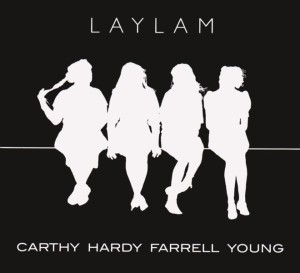 Eliza Carthy was a young up-and-comer when I first encountered her playing fiddle and singing backup in 1996 on her mother Norma Waterson’s self-titled solo album. In the ensuing couple of decades she has become one of the leading forces of what amounts to an English folk revival. Here we find her fronting an eponymous quartet of British singing female fiddlers on a wonderful album of traditional and contemporary songs from both sides of the Atlantic.
Eliza Carthy was a young up-and-comer when I first encountered her playing fiddle and singing backup in 1996 on her mother Norma Waterson’s self-titled solo album. In the ensuing couple of decades she has become one of the leading forces of what amounts to an English folk revival. Here we find her fronting an eponymous quartet of British singing female fiddlers on a wonderful album of traditional and contemporary songs from both sides of the Atlantic.
In addition to Eliza, this group Carthy, Hardy, Farrell & Young comprises Bella Hardy, who has released four critically acclaimed albums and whose song “The Herring Girl” won the BBC Radio 2 Best Original Song title in 2012; Lucy Farrell, who also plays viola and saw, performed with Jonny Kearney in the duo Lucy and Jonny, and has been nominated for two BBC Radio 2 folk awards; and Scotland’s Kate Young who also plays cello and who released her first album as Kate in the Kettle in 2012.
Laylam which Carthy says means “chorus,” is a showcase for the group’s four-part harmonies and the interplay of their four fiddles, in combinations that include violins, viola and cello. It’s also an excitingly diverse selection of songs in a range of styles, from old English folk to American jazz, pop, country, and spirituals, plus some shanties and a contemporary folksong by Carthy.
The arrangements by the musicians are clever and creative, and the recording and mixing by them and Oliver Night are superlative. The songs occasionally become dense with fiddles and vocals, but they nearly always have plenty of “air” in them that allows the attentive listener to focus in on one instrument or voice. As a whole, it sounds as though it was recorded with all four musicians around one microphone in a comfortable livingroom.
That particularly aids some of the more dramatic vocal songs, including my early favorite, “Wide River” by Nashville residents Buddy and Julie Miller. Hardy takes the lead on this one in her warm alto over minimal accompaniment on a strummed violin, but the spine-tingling moment comes when the other three voices join in on the first chorus. Hardy also takes the lead on a bluesy cover of the song “Walking After Midnight” which you’ll recognize as a 1950s hit for Patsy Cline. Young plucks her cello like a bass on this one and Hardy is backed once again by glee-style harmonizing from the other three. Young sings lead on another American cover, the jazzy, bluesy “Why Don’t You Do Right?” which was a hit in the ’40s for Peggy Lee. This is a fabulous arrangement with all kinds of vocal gymnastics on the doo-wop-style harmonies.
The creative arrangements extend to the traditional songs, especially the adorable “Chickens In The Garden” about a lad in love with a Yorkshire farmer’s lass, which is where I first noticed the expert mixing. Carthy leads this one, on which the players employ a fun mix of strumming and bowing and a multi-part improvised ending. The most driving arrangement is the rocked-up opening track “Greasy Coat,” which has a long chamber-style instrumental introduction and call-and-response vocals. Carthy’s glorious contralto forms an especially sturdy base to this one. Farrell takes the lead on a couple of trad songs on the disc’s first half, the American “Little Birds” and the English “Dewdrop.” The former is a very pretty arrangement, nearly too pretty, even, but that’s balanced by its pairing with a Scottish dance tune “Le Canal en Octobre” by French accordionist Frédéric Paris. “Dewdrop” is a dark, dramatic tale of mismatched love paired with an instrumental jig played on violin and viola with lots of wild dips and swoops.
The second half of the disc is a bit quieter but no less dramatic if you listen closely. After Farrell leads on the stark arrangement of the old English song “Myrtle Tree,” her only instrumental accompaniment a single plucked note on the third and fourth beats of each measure, Carthy presents a complex chamber-folk arrangement of her “June Is The Coldest Month.” The haunting lyrics are complemented by a little bit of musical saw from Farrell during the instrumental bridge, and some mournful cello in the outro. Hardy and Young each sing a slow shanty, the former a starkly beautiful rendition of “Sally Free And Easy” and the latter’s “100 Years” has dynamic Gypsy overtones in the violin parts – the kind of song American indie-rocker The Decemberists sang with relish in their early years. Carthy winds it up with an American hymn “Better Home,” a tribute to the singing of Helen Schneyer, a key figure in the Greenwich Village folk movement who died in 2005.
Carthy claims in the one-sheet accompanying this release that English piper Kathryn Tickell got these four players together. If that’s the case, well done! Laylam is a highly entertaining album with a lot of variety in the songs and arrangements, by four musicians with palpable passion for the music.
Here’s a live video of the quartet playing the opening track “Greasy Coat.”
(HemHem, 2013)
